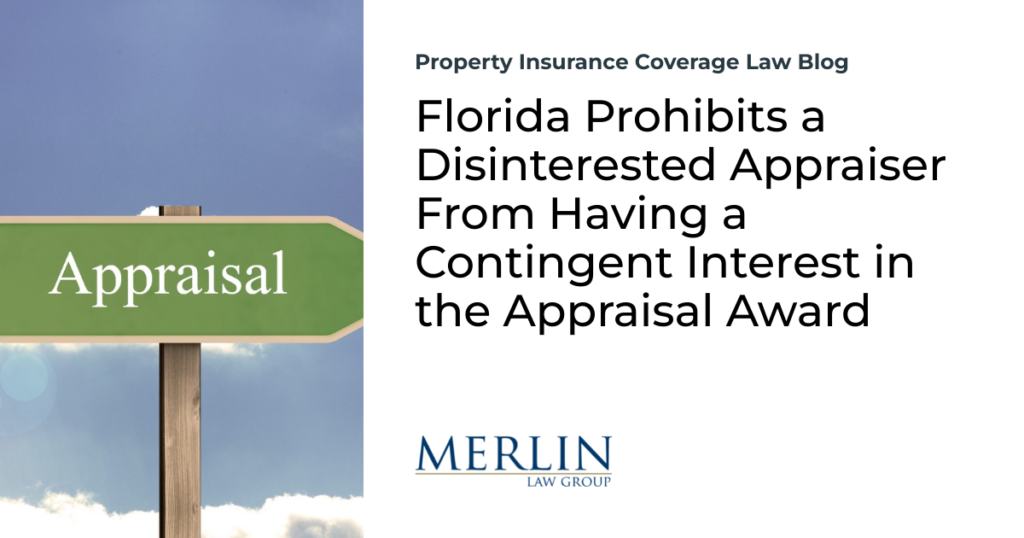Florida Prohibits a Disinterested Appraiser From Having a Contingent Interest in the Appraisal Award

The Florida Supreme Court has overruled prior precedent and ruled against appraisers charging a contingent fee or having a contingent interest in the outcome of an appraisal.1 This case will immediately impact all ongoing and future appraisals. If you are in an appraisal with a contingent interested appraiser, you need to immediately seek legal advice about your next steps.
The holding is simple:
[A]n appraiser cannot be ‘disinterested’ if he or she, or a firm in which he or she has an interest, is to be compensated for services as a public adjuster with a contingency fee.
The Florida Supreme Court went to lengths to describe the financial interest of the appraiser and the contingent fee of the public adjusting firm:
The contingency fee arrangement agreed to between Mr. Parrish and KCC gives Mr. Keys, as president of KCC, a pecuniary interest in Mr. Parrish’s claim. As a ‘member of a limited liability company’—in this case KCC—Mr. Keys is by definition an ‘interest holder’ in it. See § 605.0102(31)(f), Fla. Stat. (2022). And here, Mr. Keys’s interest is of a pecuniary, or financial, nature. See Financial Interest, Black’s Law Dictionary (11th ed. 2019) (defining ‘financial interest’ as ‘[a]n interest involving money or its equivalent’). Put simply, the more Mr. Parrish recovers, the more KCC collects; and the more KCC collects, the likelier it is that Mr. Keys will himself be in a position to be paid, or that his interest in KCC will be valuable. Mr. Keys’s pecuniary interest in evaluating Mr. Parrish’s loss such that Mr. Parrish recovers as much as possible means Mr. Keys is not “disinterested.” To the contrary, the whole point of the contingency fee agreement is to align Mr. Keys’s economic interests with Mr. Parrish’s.
While I can appreciate this reasoning supporting the decision, the Court made a number of gaffs other members of Merlin Law Group highlighted to me. The biggest was the following:
[P]arties to a contract choose their words on purpose, and we respect those choices when we can discern them.
When did the insured get to agree to accept a standardized wording scheme between insurance companies? Every law school student taking a basic insurance law class is taught that the policyholder has no ability to agree to boilerplate language found in the vast majority of insurance policies. The policy is an adhesion contract. How justices missed this basic legal contract concept noted in legions of other insurance policy interpretation cases is disappointing.
For the benefit of those wishing to read the briefs of the parties, I attach them in the footnotes.
Thought For The Day
To improve is to change; to be perfect is to change often.
—Winston Churchill
1 Parrish v. State Farm Florida Ins. Co., No. SC21-172 (Fla. Feb. 9, 2023).







